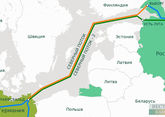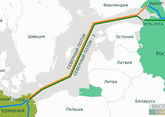The economic event of the week - the European Commission initiated a decision that there is no need for Nord Stream 2, explaining its point of view by reducing gas consumption in Europe, increasing the competitiveness of the LNG supplies from the US and a desire to support the Ukrainian transit of Russian gas. Vestnik Kavkaza spoke with Deputy Energy Director of the Institute for Energy and Finance Alexey Belogoriev on the significance of this initiative for the Russian export pipeline projects and the reasons for such a decision taken by the EC.
- Alexey Mikhailovich, in your opinion, what are the consequences of this decision for Nord Stream 2?
- The European Commission currently has no mandate to negotiate on the North Stream 2 project, it is not in its power to disseminate the norms of the Third Energy Package on third-party access to pipelines of the offshore gas pipelines.
Now in Europe, two initiatives, aimed at preventing the construction of Nord Stream 2, are proceeding in parallel. The first is a spread of the norms of the Third Energy Package on the third-party access to gas pipelines of the offshore pipelines, but such a decision can only be taken by the European Parliament, since it requires amending of the European legislation. Only the European Commission has agreed on this amendment. It may well be accepted, but there is such a problem as a contradiction to the international maritime law, which causes a conflict in the sphere of international law that Gazprom2, like other project participants, can turn to its advantage. if the decision is made at the EU level, it can be contested.
The second initiative is linked to the allocation of a mandate for the European Commission to negotiate with the participants of the Nord Stream-2 project, and it is trying to get it, but the consent of all the EU countries is necessary for this. At least Germany categorically opposes such a mandate. For these reasons, so far, no legal obstacles to the implementation of the Nord Stream-2 project have been created, and if they appear the next year, they will not be absolute.
-In your opinion, is Europe really going to reduce gas consumption in the foreseeable future, according to the European Commission?
- In the past three years, the demand for gas in the European Union has been growing. This Monday, Eurogas announced its forecast by the end of the year - an increase in demand for gas in the EU by 5.9%. This is most likely a medium-term, not long-term trend, it will persist for the next 2-3 years due to various factors, such as expectation of the economic growth and cheapness of gas in the European market, stimulating its consumption, especially in the electricity generation. As for the long-term outlook, the consensus forecast is that gas consumption will be stable, at least until 2030-2035. Further forecasts diverge: the representatives of the European Commission themselves and experts who make ordered estimates say that consumption will drop sharply due to the creation of industrial power storage units that will displace gas as a backup fuel for the electricity generation; while, for example, the US Energy Information Administration expects a sharp increase in gas consumption in the EU after 2030 due to the growing number of electric vehicles.
The general opinion is that in the next 10-15 years, consumption will more likely stagnate after returning to the level of the end of the 2000 - the beginning of the 2010. However, gas production within the EU is now declining fairly quickly, Norway has reached its peak production this year, and in fact, due to the country’s gas, the EU has been able to maintain a stable share of imports from the non-European sources over the past 20 years. Thus, with constant demand and falling production, the demand for imports will grow, and provisionally, until 2025, none of the pipeline suppliers, except of Russia, will be able to increase its supplies seriously to meet this growing demand. Algeria and Libya have severely limited export potential, Norway no longer has prospects for production growth. Azerbaijan is capable of supplying 10 billion cubic meters of gas per year of additional supplies, but for the European market this is a small amount.
- In this case, who can become a rival to Russia on the European market?
-Only the global LNG market can compete with Russia. It is worth noting that the American LNG is not primarily exported by American companies - Americans only extract and liquefy gas, but international companies buy and sell it to Europe, Asia and other regions. In this sense, it does not matter what the origin of gas is, whether it is American, Australian or Russian. The same is on the oil market, where the source of oil is not important for traders, but the oil grades are differed by their characteristics, and in the gas market the product is almost homogeneous, and here the national bounds are even less significant. What can happen in 2025? First, the industrial power storages may appear, but many expect that they will be created much later, that is, 2025 is the most optimistic forecast for them. The second, gas from Iran, Iraqi Kurdistan and Turkmenistan can enter the European market. Whether it is going to happen, is difficult to say, but there is potential. Until then, Russia will compete with LNG, and the competition will be of a price nature, as far as much has been done in the European market to develop a competitive environment and exchange pricing over the past 15 years.
In this regard, LNG will massively flow to the European market under two conditions. First of all, gas prices should rise by at least 20%, then, price arbitrage, that is, the difference in prices between the Asian and European markets, should become minimal, so that supplies to Asia would not be more profitable than deliveries to Europe. Now the situation is such that China takes back the LNG proposals that appear on the market, including the US ones. Since January 2016, 90% of the total exported US LNG has been being delivered to the Asia-Pacific and Latin America, about 10% came to Europe. And yet, although LNG consumption will increase in Europe undoubtedly, against the backdrop of growing imports, Gazprom will still have an additional niche for supplies. And in this sense, the statement that in 2020, when the contract with Ukraine is over, it will not be necessary to have the additional capacities for the transportation of Russian gas, is an old and rather deep misconception of the EC officials. This confusion is largely due to the high staff turnover: while some people are trying to understand the technological side of the issue, they already have to leave, and new people come and review the issue from a purely political or economic point of view.
At the same time, from the technological side, the essence is that the Ukrainian Soyuz, Urengoy-Pomary-Uzhgorod and Progress gas pipelines, delivering gas to Europe, have already worked out their resources and are working at the limit of their technical capabilities. Gas consumption for own needs of these gas pipelines is about 6% of the volume of pumped gas at a rate of 0.5%, and this is due to a high depreciation of the pipes and compressor stations. They need to be fully modernized, the cost of modernization is estimated at about $ 10 billion, or to build bypass pipelines, and this is just the Nord Stream 2 and Turkish stream projects.










